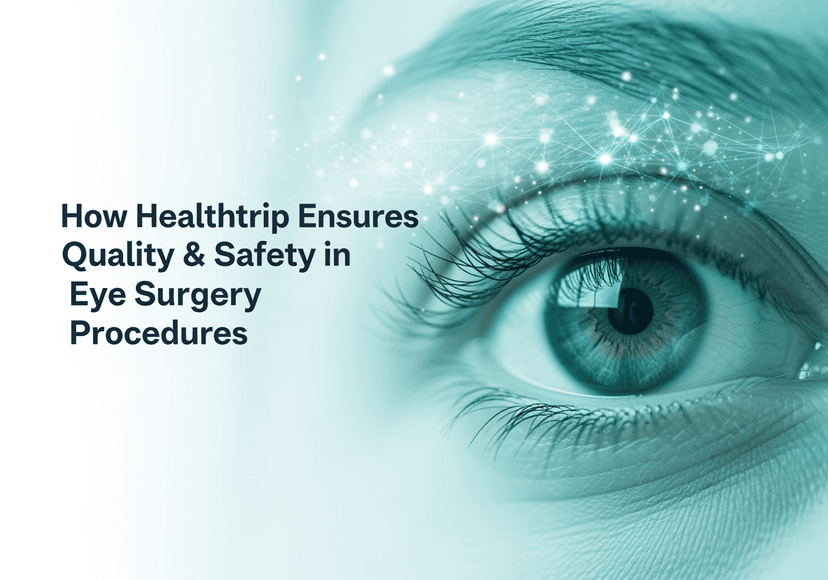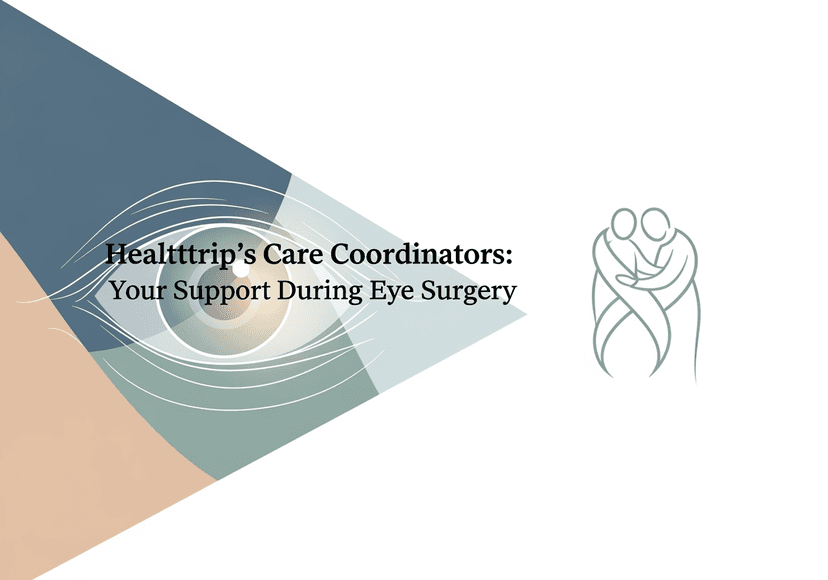
Types of LASIK Eye Surgery in India
11 Apr, 2023
 Healthtrip
HealthtripIf one were to contemplate undergoing LASIK eye surgery, it would be pertinent to explore the various genres of this procedure available in India. (Laser-Assisted In Situ Keratomileusis) , commonly known as LASIK, is a prevalent approach to address optical predicaments such as nearsightedness, farsightedness, and astigmatism. The ensuing essay will delve into the diverse types of LASIK eye surgery offered in India, their respective merits, and the factors to consider when selecting the ideal LASIK surgery for one's needs.
What is LASIK Eye Surgery?
Most popular procedures in India
LASIK ocular surgery is a surgical intervention that involves the use of a laser to reform the cornea, which is the translucent anterior part of the visual organ. The principal objective of this medical procedure is to rectify ocular anomalies such as myopia, hyperopia, and astigmatism. The ultimate goal of LASIK eye surgery is to ameliorate visual acuity, thereby obviating the exigency for spectacles or contact lenses.
Traditional LASIK Eye Surgery
Wellness Treatments
Give yourself the time to relax
Lowest Prices Guaranteed!

Lowest Prices Guaranteed!
Traditional LASIK eye surgery is the most common type of LASIK surgery performed in India. In this procedure, a microkeratome (a small, handheld blade) is used to create a thin flap in the cornea. The flap is then lifted, and a laser is used to reshape the cornea. The flap is then replaced, and the eye is allowed to heal.
Bladeless LASIK Eye Surgery
Bladeless LASIK eye surgery stands as an alternative to the conventional LASIK eye surgery. It deviates from the regular technique by relying on femtosecond lasers to create the corneal flap, in contrast to a microkeratome blade. This surgical approach has earned the alias "all-laser LASIK." Bladeless LASIK surgery boasts of enhanced accuracy and a potentially shorter recuperation period compared to the traditional LASIK surgery.
Wavefront LASIK Eye Surgery
Wavefront LASIK eye surgery is a surgical procedure of the LASIK type that employs a three-dimensional depiction of the eye to direct the laser that alters the shape of the cornea. This technique facilitates a more meticulous intervention and can lead to improved visual results. The employment of Wavefront LASIK eye surgery is typically advocated for patients with higher-order aberrations, which are vision problems that are more intricate in nature.
Topography-Guided LASIK Eye Surgery
Topography-counseled LASIK ocular surgery is a novel LASIK procedure that employs a topography-counseled laser system to produce an elaborate 3D portrayal of the oculus. This portrayal is utilized to direct the laser while it restructures the cornea. It is typically suggested for patients who possess irregular corneas, notably individuals with keratoconus.
PresbyLASIK Eye Surgery
PresbyLASIK eye surgery is a type of LASIK surgery that is designed to correct presbyopia, which is an age-related condition that makes it difficult to see up close. This procedure uses a multifocal lens to correct both near and distance vision.
SMILE Eye Surgery
SMILE (Small Incision Lenticule Extraction) ocular surgery is a more modern version of LASIK surgery, which employs a femtosecond laser to craft a diminutive, slender, discoid piece of material within the cornea. This structure is then eliminated via a minute opening. SMILE ocular surgery is less intrusive than the traditional LASIK surgery and could lead to a decrease in the manifestation of dry eye symptoms.
Epi-LASIK Eye Surgery
Epi-LASIK eye surgery is a type of LASIK surgery that uses a mechanical device called an epikeratome to remove the outer layer of the cornea. The laser is then used to reshape the cornea. Epi-LASIK eye surgery may be recommended for patients with thin corneas or those who are not good candidates for traditional LASIK surgery.
LASEK Eye Surgery
LASEK (Laser Epithelial Keratomileusis) eye surgery bears some similarity to the Epi-LASIK eye surgery technique. However, rather than making use of a mechanical device to rid the cornea's outer layer, a special solution is implemented to loosen and elevate said layer. The cornea is then reshaped with the aid of a laser. Patients who suffer from thin corneas or who are not ideal candidates for the conventional LASIK surgical method may be advised to undergo LASEK eye surgery.
PRK Eye Surgery
PRK (Photorefractive Keratectomy) eye surgery is a type of LASIK surgery that does not use a flap. Instead, the outer layer of the cornea is removed and the laser is used to reshape the cornea. PRK eye surgery may be recommended for patients with thin corneas or those who are not good candidates for traditional LASIK surgery.
Which LASIK Surgery is Right for You?
When determining the optimal LASIK surgery for your specific needs, several factors must be taken into consideration. These factors may include the degree of severity of your vision problems, the thickness of your corneas, as well as any additional ocular conditions that may be present. It is highly advisable to consult with a highly experienced ophthalmologic surgeon, who can conduct a thorough evaluation of your individual case and provide expert guidance in selecting the most appropriate type of LASIK procedure for your unique needs.
What to Expect During LASIK Eye Surgery
LASIK, a surgical procedure that deals with the correction of refractive errors of the eye, is commonly executed on an outpatient basis and takes approximately fifteen minutes to complete per eye. The surgical operation commences with the application of anesthetic eye drops onto the ocular organ and the subsequent placement of a suction ring around it to steady it. The cornea is then reshaped with the aid of a laser, and the corneal flap, if necessary, is repositioned. Although the procedure may induce some degree of pressure and discomfort, it is not typically associated with severe pain.
Recovery After LASIK Eye Surgery
After undergoing LASIK eye surgery, one may experience a mild degree of discomfort, sensitivity to light, and blurry vision. It is recommended that you avoid any physical activity that might agitate the eyes, and instead follow the surgeon's instructions on the use of ocular drops. Following the procedure, most patients can resume their daily routines, including professional obligations, within the range of several days to one week.Risks and Complications of LASIK Eye Surgery
While LASIK eye surgery is generally safe and effective, there are some risks and complications to be aware of. These can include dry eyes, glare, halos, double vision, and vision loss. It is important to discuss these risks with your surgeon before the procedure and to follow all post-operative instructions carefully.
Conclusion
LASIK eye surgery is an array of procedures available in India, comprising traditional LASIK, SMILE, Epi-LASIK, LASEK, and PRK. Each surgery variation carries distinct benefits and considerations, and the selection of an appropriate surgery type relies on personal needs and circumstances. By and large, LASIK eye surgery is effective and safe, offering a durable remedy to visual impairments. Nevertheless, awareness of the associated risks and complications is paramount, and it is essential to select a qualified and adept eye surgeon to perform the surgery. Adequate care and follow-up after the LASIK eye surgery can enhance your quality of life and improve your visual abilities.
Related Blogs

How Healthtrip Ensures Quality & Safety in Eye Surgery Procedures
Detailed guide on eye surgery, featuring doctors, hospitals, risks, recovery,

End-to-End Logistics for Eye Surgery with Healthtrip's Support
Detailed guide on eye surgery, featuring doctors, hospitals, risks, recovery,

Healthtrip's Care Coordinators: Your Support During Eye Surgery
Detailed guide on eye surgery, featuring doctors, hospitals, risks, recovery,

Top 5 Indian Hospitals for Eye Surgery
Detailed guide on eye surgery, featuring doctors, hospitals, risks, recovery,

Post-Eye Surgery Diet and Lifestyle Tips
Detailed guide on eye surgery, featuring doctors, hospitals, risks, recovery,

Common Risks in Eye Surgery and How Healthtrip Manages Them
Detailed guide on eye surgery, featuring doctors, hospitals, risks, recovery,










